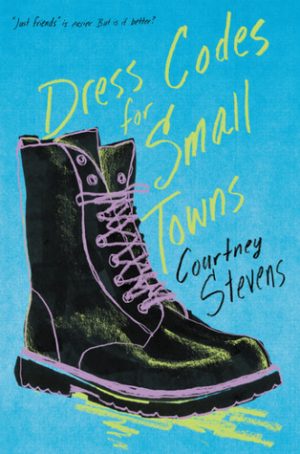How not to dress the part: a “Dress Codes for Small Towns” review
Courtney Stevens’ overly ambitious third novel tries to conquer too much despite an interesting premise.
Announcer: Welcome to “Another Unpopular Opinion”! Here’s your host, Luke Reynolds!
*audience mostly claps and cheers, some boo*
Luke: Thank you, thank you! I know some of you are pretty much sick of hearing people gripe about books they didn’t like, but others seem to love it for some reason. Today I’d like to talk about the newest book from Courtney Stevens, “Dress Codes for Small Towns”.

I really liked Stevens’ first two novels. Her debut, “Faking Normal”, and the one that followed a year and a half later, “The Lies About Truth”, were both solid contemporaries. The protagonists were likable, the character and parental dynamics were interesting, the circumstances were painful but always well-explored and the love interests were pretty good too! They were actually sympathetic and really nice, always treating our leading lady well and respecting what she needed. Quibbles aside, Stevens’ work has been pretty solid.
It’s been one and a half years since I picked up the second Stevens novel and two years since she’s released one. This new title, formerly known as “Dressing the Part”, sounded interesting. A girl exploring where she belonged on the sexuality and gender spectrum while being surrounded by her five best friends and their schemes to making their town a better place? Ambitious, but it could be pulled together. Stevens has also tackled the subject of faith before, as she was a youth minister at some point, but in this read? Things would definitely take a new turn since the protagonist was the daughter of a youth minister.
Or at least I thought they would. Honestly, I was very disappointed with “Dress Codes for Small Towns”. This felt like an overly ambitious debut instead of a third novel. Stevens decided to reinvent herself with this, but in the process, she lost her good writing, her everyday life plots that still felt relevant to the story and that essence that made them believable. Needless to say…I didn’t like this book.
*gasp from audience; blonde-haired woman stands up, her lips curled in anger*
Protesting Woman: How can you say that? Do you not like descriptive, heartfelt writing that lets you fully imagine a place and feelings? Do you not like slice-of-life books that aren’t always on and on about the plot? What about those characters that challenged gender norms and sexuality? That’s what you really didn’t like, wasn’t it? You’re homophobic! HOMOPHOBE!
Luke: *sigh* Security, take her away.
*two security guards come from both sides of the aisle, grabbing the woman’s arms; she kicks and screams as she’s escorted away from the audience*
Luke: Now, where was I? Right. The book. Should we start off with the positives or negatives?
*audience chants “Negatives! Negatives!”*
Luke: Are you sure? Wouldn’t it be better to talk about the things I liked?
Random Man: *shouts* Just get on with the negatives already!
Luke: O-okay, roger that, I guess!
I read this book without skimming it and still have no idea what it’s about. Is it about Billie McCaffrey navigating her sexuality and gender identity in a small town? Sure. Is it about her circle of friends, the Hexagon, and their personalities and what they like to do? You bet! Is it about Davey at parts, the eyeliner-wearing music lover who’s pulled between a harsh politician dad and private school while slowly growing to love Otters Holt? Yep! Is it about Billie’s art projects, including a sofa she’s making out of newspaper? Why, of course! What about her friends trying to come together to save the Harvest Festival in their town after its biggest donor passes away? That’s what this book is about, too. Let’s not forget the possibility of Billy winning the Corn Dolly, the highest regard for a woman in Otters Holt!
As you can see, there are way too many plot points in this book. Stevens’ slice-of-life format struggled under the weight of all she wanted to accomplish. She put too much fluff (filler content, maybe an event to accent a friendship or a person’s view on a topic) and substance (the actual building blocks of a story: plot, characters, conflict) into the narrative, so this became quite a chore to read. Sometimes authors put too much fluff and not enough substance or too little fluff and too much substance into their books. This had the worst of both worlds.
Also, we didn’t get a chance to really see a lot of the stuff the Hexagon did to help save the Harvest Festival. I really wanted to see those moments. They livened up the small town I was actually curious about. Of course, they get glossed over.
Now let’s talk about the characters. Most were okay. I wish Billie was actually more interesting than she was. She was supposed to be the “box-defying dynamo,” but all I really got out of her was an indecisive, horny girl who loved all her friends and couldn’t make up her mind about what she wanted.
Fifty and Mash were the only two out of the Hexagon that got absolutely no development, with only a few characteristics to help them stand out: Fifty was the a-hole, Mash the braid-wearing black guy who was Davey’s cousin. That’s it.
Davey, Janie Lee, and Woods were fleshed out, and Davey even had his own POV chapters that really added nothing to the story. He actually ended up being the most interesting outside of those vignettes. I really liked the conflict of gender expectations with his dad. Janie Lee was the sweet, heart-shaped faced girl who played violin, and Woods was the master of the house, singer, and planner of all things on his handy-dandy whiteboard, Einstein.
*audience member raises her hand*
Curious Cathy: Is it okay if I ask what happens to these characters throughout the story?
Luke: Yes, of course. They don’t really change throughout. Billie is given an arts-and-crafts hobby and Davey does cosplay, but really Davey gets the spotlight with that. Nothing is accomplished with either of these aside from a convention where they win money. Everyone else is just stagnant and floats along.

We should move on to the writing of the book, because that’s where my biggest issues with this novel lie. Stevens has always had a simplistic but emotional way of telling a story, but she lost that here. You could tell she was really trying to make “Dress Codes for Small Towns” cool. The result? Some of the most pretentious and nonsensical writing I’ve seen in a long time. It’s actually very John Green-esque: “improbably witty,” as coined by a reporter for The New York Times. Let’s take a look.
*clears throat*
Luke: “Bring on the gerontological penance.”
Curious Cathy: What?
Luke: Exactly. I still have no idea what this means even after looking it up on Google. But wait. There’s more.
“My brain crunches thoughts so loudly it sounded as if I were snacking on Doritos.”
“We tumbleweed to our bikes….”
“I feel a strange kinship with this incredible but very normal feat.”
“Not only is he doing to die in the 42045 zip code….”
“Mom beckons my brain back….”
“I want to ladle these thoughts from my head into Davey’s soup bowl.”
“Square dances were asexual before the term existed….”
And my personal favorite: “I don’t kiss everyone. I kiss the people who have the little pieces of my soul I’ve been looking for.”
Random Man: *yells* Those sound terrible!
Luke: I know why. Stevens was really trying to shoot for a literary book. These titles are usually written to affect readers a certain way. They’re the kind that try to be strong structurally, and most of the time, adults love them and kids are hesitant. This book did reach its targeted audience, though. The front is filled with glowing praise from authors and several major literary publications, two of which gave this a star.
Curious Cathy: But doesn’t that mean we should value it?
Luke: If you liked the book, you can value it however you want. But the starred reviews don’t guarantee the novel will be valued and liked by its audience. I’m one of those people. In a sea of nothing but praise, I am one of the only ones who didn’t get this book. But if you do, no judgment. You’re a different reader than I am.
Curious Cathy: Thanks.
Random Man: Word.
Luke: My positives are small. Like I mentioned before, Davey’s conflict with his father was pretty neat. And there were sections when Stevens wasn’t focused on the literary writing and stripped it back to an emotional core that reminded me of her earlier books. I even laughed at some of the lines that were genuinely funny.
But I’m still left incredibly disappointed with “Dress Codes for Small Towns”. Whatever point Stevens was trying to make got lost in the mess that was this book. An overstuffed plot, stagnant characters, and over-the-top writing made this collapse, and it’s disheartening as a fan of Stevens’ older works. I really recommend those two, and for a book that conquered the themes and conflict here but in a better fashion and in a private performing arts school with a capella, check out Riley Redgate’s “Noteworthy”. It has excellently detailed writing without going overboard and several scenes that hit home. You shouldn’t miss it.
That’ll be all. Thank you so much, and until the next unpopular opinion, good night!
*applause*
Your donation will support the student journalists of West High School. Your contribution will allow us to purchase Scholarship Yearbooks, newsroom equipment and cover our annual website hosting costs.

This is Luke's first and only year as a member of West Side Story. He'll be kept busy with anchoring, editing and reporting, but he's gonna have fun while...


